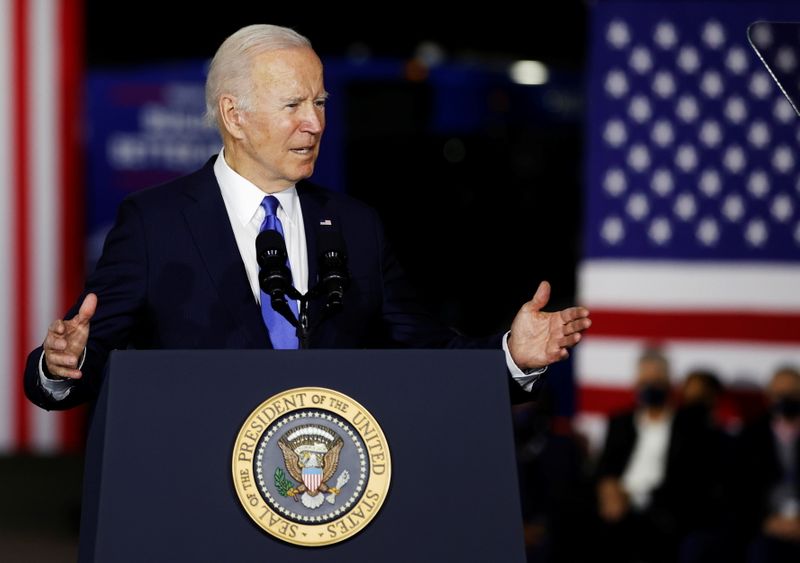By Nandita Bose and Chris Gallagher
WASHINGTON (Reuters) - President Joe Biden, bracing for another jump in inflation, sought to reassure Americans on Thursday that rises in energy costs and other key goods were starting to ease, but said the change might not be reflected in November data due on Friday.
The consumer price index (CPI) for November is expected to have risen 6.8% compared with the same month last year, a Reuters poll of economists showed, overtaking a 6.2% increase in October, which was the fastest gain in 31 years.
"The information being released tomorrow on energy in November does not reflect today's reality, and it does not reflect the expected price decreases in the weeks and months ahead, such as in the auto market," Biden said in an unusually long statement issued ahead of Friday's data.
Republicans have seized on the issue to criticize Biden's sweeping spending agenda, and it has weighed on the president's approval ratings in recent months.
Those claims are not fully backed up, given that inflation is global, and the annual inflation rates for numerous goods routinely purchased by American households - including food - were already at their highest levels in a decade before Biden entered the White House early this year.
He repeated that passing his $1.75 trillion "Build Back Better" social spending plan would help lower costs.
Biden's top economic adviser Brian Deese appeared at the regular White House briefing to hammer home the same message.
He touted a drop in unemployment numbers to 1969 levels, a rise in real household income and what he called "encouraging signs" in labor force participation, while cautioning against over-interpreting Friday's data.
"That data is by definition backward-looking and so it won't capture some recent price movements, particularly in the areas of energy," Deese said, citing a nine-cent drop in gasoline prices nationally.
Deese said 20 U.S. states have gasoline prices below the 20-year average, and more states should join their ranks in coming weeks. A "very dramatic decline" in natural gas prices would also help ahead of the winter heating season, he said.
Deese also noted declines in shipping costs and certain commodities, including wheat and pork, as well as a drop in wholesale used car prices that should push consumer prices lower.
The November core CPI, which excludes volatile food and energy components, is expected to have accelerated to a 4.9% annual increase from the prior month's 4.6% gain, a Reuters poll showed.

Federal Reserve Chair Jerome Powell said last week the U.S. central bank needed to be ready to respond to the possibility that inflation may not recede in the second half of next year as most forecasters currently expect.
Deese declined to predict if rising prices could continue into next year, but said most independent forecasters expected inflation to moderate "meaningfully" over the course of 2022.